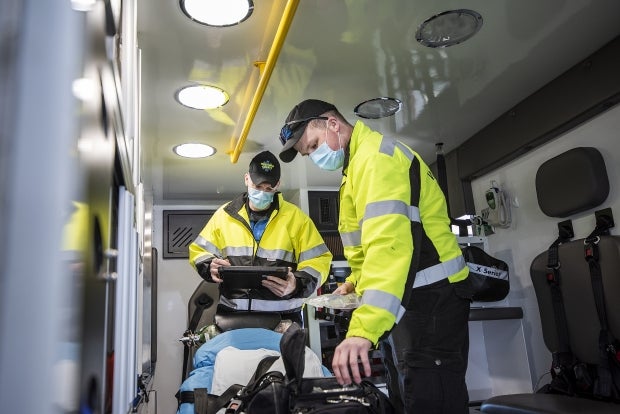New Laws Aim to Help State’s Emergency Medical Services
Gov. Evers signed 2 bills to train more EMS personnel, hike state funding.

Paramedics Sean Mueller, center, and Frank Rohl, right, check one of the two ambulances at their station to ensure that their supplies are not expired Tuesday, Feb. 16, 2021, in Wild Rose, Wis. Angela Major/WPR
Two bills signed into law this week intend to improve staffing and reduce costs on emergency medical services around the state, with the head of Wisconsin’s EMS Association saying current staffing is “almost crisis level.”
Senate bills 182 and 183 make several changes to emergency medical services, including reducing the cost of seeking an EMS-related license and raising the Medicaid reimbursement rates for providers if a call ends without taking a potential patient to the hospital.
One of the bills also provides grant funding for a live 911 pilot program, which would allow some dispatchers to connect with callers by video call, similar to using the video calling service FaceTime.
Alan DeYoung is the executive director of Wisconsin EMS Association. DeYoung told WPR’s “Wisconsin Today” that pay and short staffing are making EMS work hard throughout Wisconsin.
“I know many individuals in EMS that work three to four jobs. This may not be their full-time (job). Many times it’s not, especially in rural areas,” DeYoung said. “It’s one of the toughest jobs because you’re literally dealing with life and death. You’re seeing the worst of the worst, but also by the same token, you can have the greatest impact on your community.”
DeYoung talked with “Wisconsin Today” about the legislation and what more is needed to improve emergency medical service departments throughout the state.
The following was edited for clarity and brevity.
Kate Archer Kent: What excites you most about these two new laws?
Alan DeYoung: Wisconsin Act 35 as it is called now essentially pays for all EMS education throughout the state. Now it’s done through a reimbursement, so obviously we want people to pass their programs and get licensed. But the way the bill was structured, it basically reimburses either the individual or their employer.
“Employer” is vague. “Employer” does not have to be an EMS agency. I could see many of our Wisconsin employers taking an even more active role in getting individuals trained in emergency medical response. So you could think of manufacturers who do have to typically abide by some OSHA (Occupational Safety and Health Administration) safety standards with first aid and CPR. Well, now they could even send people to become EMRs and EMTs.
KAK: Is the cost of licensure and continuing training holding back people who want to have a career in EMS?AD: Definitely, that’s one of the major factors … cost plays a role, especially if you are getting into it and then knowing that you may not be paid very much, especially compared to our counterparts in police or even just really any other industry. There are areas where you can work at Kwik Trip and make more than you do as an EMT or (Advanced) EMT. So cost is definitely a factor.
KAK: Another new law raises the current amount EMS providers are reimbursed by Medicaid when a patient is not taken to the hospital. How much of a financial impact will this have on EMS departments in Wisconsin?
AD: I think it’s a great step in the right direction because I think most of the public doesn’t realize that if EMS doesn’t transport you, they receive no reimbursement at all. So if there’s no funding on a local level — or even just very little funding on a local level, which is the typical case — that’s where the funding shortages come into play. This helps to say, “Look, we’re not pushing towards transporting people if they don’t need to be.”
This actually incentivizes more of that on-scene care … paramedics train many of their skills of what a physician would do in terms of their scope, and so there’s a lot of things we can do on-scene for treating what’s needed, but we need some type of reimbursement for that. Under private (insurance) and Medicare, we don’t get any reimbursement at all. Under Medicaid, we were reimbursed $69 for not transporting somebody. But now that’s going up to $175. So it’s a significant increase from what it was.
New laws aim to train more emergency medical responders, increase EMS reimbursement was originally published by Wisconsin Public Radio.
If you think stories like this are important, become a member of Urban Milwaukee and help support real, independent journalism. Plus you get some cool added benefits.




















